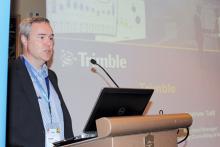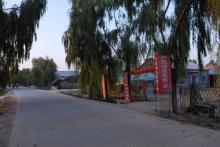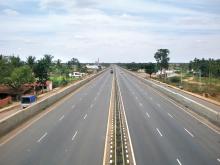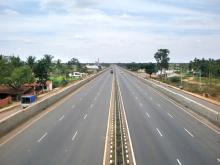Indonesian infrastructure investment is seeing major highway expansion - Simon Gould writes Over the next 12 years, Indonesia has planned some massive infrastructure investments, under a master plan aimed at bringing it up to developed country status by 2025. Its Government’s Masterplan for Acceleration and Expansion of Indonesia's Economic Development (MP3EI) envisages infrastructure spending of US$400 billion between 2011 and 2025 to help achieve this (see sidebar for more on MP3EI). With limited funds of
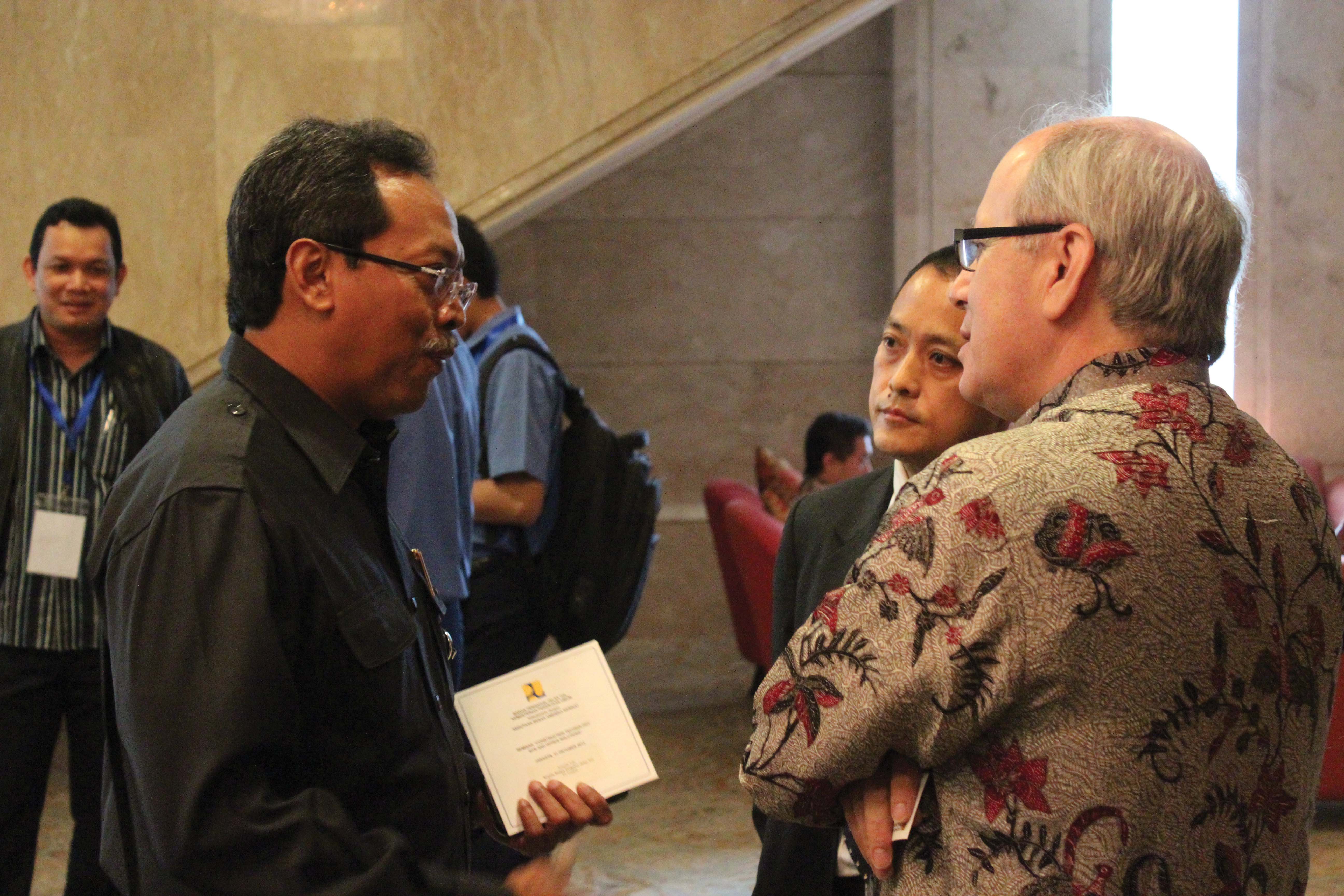
Between the speakers were opportunities for contractors, officials and panelists to discuss issues on a one to one basis
Indonesian infrastructure investment is seeing major highway expansion - Simon Gould writes
Over the next 12 years, Indonesia has planned some massive infrastructure investments, under a master Plan aimed at bringing it up to developed country status by 2025. Its Government’s Masterplan for Acceleration and Expansion of Indonesia's Economic Development (MP3EI) envisages infrastructure spending of US$400 billion between 2011 and 2025 to help achieve this (see sidebar for more on MP3EI).
With limited funds of its own for this level of infrastructure spending, the Indonesian Government is looking to Public-Private Partnerships (PPPs) to bring in the required level of investment.
And with international investments looking for the highest levels of transparency, accountability and process to ensure timely and cost-effective project delivery, the latest construction industry technology is seen as playing a key part in the country’s infrastructure development.
That’s where2122 Trimble comes in, as Andrew Tull, regional manager Consulting Services with Trimble Asia Pacific Heavy Civil Construction explains.
“We saw an opportunity for Trimble’s Connected Site solution – which uses technology to improve efficiency and productivity, while minimising waste and expense – to assist Indonesia in achieving its ambitious infrastructure construction plans,” he said.
“In June 2013, I made a presentation to the US Commercial Service and a director of the Indonesian Toll Road Authority (Badan Pengatur Jalan Tol, or BPJT) giving an overview of Trimble Technology for construction.
“At this meeting, we introduced emerging opportunities represented by new technologies such as Trimble’s Connected Site concept,” said Andrew.
“BPJT’s director, Bambang Eko Hargianto was very impressed, impressed enough that we discussed the 1000km of toll road projects planned and in the pipeline for 2014.”
As a result, Bambang suggested Trimble host an event where all the licensed toll road contractors could gather in one place and better understand how this technology can benefit their businesses.
This event, Construction Technology, Site and Office Solutions, took place in Jakarta in early November 2013.
“We flew in a number of Trimble experts to explain and demonstrate our range of products to over 20 Indonesian contractors,” said Andrew.
“We were delighted that both BPJT secretary Arief Witjaksono, and David Gossack, Counsellor for Commercial Affairs at the US Embassy in Jakarta could also attend and make presentations.”
“It was an Ideal opportunity to present the latest developments in emerging road construction technologies to the key contractors who will be responsible for delivering these massive road construction projects over the next decade.”
“We gave them a detailed overview of the technology that is available now, what is coming down the track, and how it can help them deliver construction projects to the highest quality standards and tolerances, transparently and cost-effectively.
“We had a great response from the contractors attending, who could definitely see the advantages and opportunities this technology could deliver on their projects,” Andrew said.
US Embassy Counsellor David Gossack focused on the importance of the infrastructure program planned under MP3EI for Indonesia.
“Indonesia is one of the big global success stories. I know a lot of people talk about the BRIC (Brazil, Russia, India and China) countries; well, Indonesia is generally considered to be one of the next BRICs,” he said.
“It's a big country, with a significant record of economic growth.”
“Over the past decade, growth has been over 5% on average, while in the last five years it has been averaging more than 6% year on year.”
“It is also one of the few countries that came through the global financial crisis of 2008-2009, with over 4% growth during that time.”
David said Indonesia is now number 16 in the world in terms of its economy, with favourable projections by the World Bank and other institutions over the next five years.
“Infrastructure for Indonesia is recognised as a top national priority, especially if current economic growth levels are to be maintained.
“Indonesia, like everywhere, has its own unique characteristics for road construction and, even within the country, some very different challenges for building toll roads,” he said.
For example, Java, with 140 million people is the most densely populated island in the world – making land acquisition, whether for roads or other major developments, a very difficult prospect.
“Particularly on road construction projects, land acquisition is a key issue.
“Before the BPJT can issue a concession on a toll road, the law requires them to have already acquired 75% of the land for that project, because the process is so time-consuming,” David said.
To address this issue, in 2012 the Indonesian Parliament passed new legislation, aimed at making the land acquisition process for public projects – including highways and toll roads – easier and faster. This legislation will be in full effect by 2015.
On the other hand, regions such as Sumatra or Kalimantan in Borneo, are far less densely populated, but pose other major challenges due to their remoteness, climate and topography.
David said that over 90% of Indonesian businesses required at least some usage of the road system, but it was a high-cost business environment.
“Currently it is more expensive to move product per mile than it is in the US,” he said.
BPJT Secretary Arief Witjaksono said that emerging technologies had a key role to play in encouraging investment from the private sector.
“The Indonesian government is currently planning to construct more than 500km of publicly funded roads and toll roads a year for the next four to five years and beyond,” he said.
“We are encouraging private investment in toll roads; where roads are not economically or financially viable for tolling, the projects will be government supported.
“We are looking for investment from all over the world, and we want investment in Indonesian toll roads to be attractive to global investors,” said Arief.
“Today’s presentation by Trimble was really impressive and we believe the way we intend to implement this sort of technology on our road building program is going to be of interest to investors.”
“There are obviously some very smart tools available, especially for the contractor – tools which will give investors confidence that contractors can deliver the right levels of road construction quality,” he said.
Arief said that from PPJT’s point of view as the road authority, a road constructed on time and on budget to the required quality, would benefit both investors and the public who uses it.
“We do not directly profit from that outcome, but the investor does, as does the contractor.”
He said quality of construction of these projects was critical.
“For me, if the construction is less than the standard required, this will lead to headaches.
“Firstly there will be penalties from the investors, and then further ongoing investment to maintain the road to the required standards.
“So Trimble equipment and technology, I think, can really benefit the contractor.”
Arief also noted that implementing this technology could reduce costs by up to 33% compared with conventional construction methods.
“I guess, if I were the contractor, I would buy this technology and equipment to provide greater efficiency and effectiveness of my work,” he said.
“As the road building authority would like to encourage contractors to adopt this sort of technology, but it is difficult to stipulate this in the tender process.
“All we can define are the required results in terms of road quality and tolerances, but we can’t mention any kind of equipment or specific systems,” said Arief.
“Right now in Indonesia, more than 90% of people conduct business using the road system, and, in my opinion, the system is not good enough.
“We have approximately 37,000km of arterial roads; comparing this with other countries, I think we need more than double this.
“Once that infrastructure is in place, then Indonesia becomes a more desirable destination in which to do business, and we can attract investment from global companies in industries like manufacturing,” he said.
Trimble presentations at the Construction Technology, Site and Office Solutions event:
During the Construction Technology, Site and Office Solutions event, presentations were made by a number of global and regional experts from Trimble. They included:
Background on Trimble technologies and the Indonesian construction market:
Johan Smet, Director, Technology Consulting, Trimble Heavy Civil Construction Division, and Andrew Tull, Regional Manager, Consulting Services for the APAC region, Trimble Heavy Civil Construction Division.
Trimble Planning Solutions:
The economic benefits of applying advanced technologies to transport planning and construction:
James Muir, Regional Manager for the APAC region, Trimble Planning Solutions, Pty, Ltd.
Leveraging Trimble Technology throughout the project/Trimble Connected Site: A solution overview:
John Naughton, Application Engineer Manager for the APAC region, Trimble Heavy Civil Construction Division, and Dan Barry, Regional Sales Manager for the APAC region, Trimble Heavy Civil Construction Division.
About Trimble’s Connected Site
Trimble’s Connected Site solution combines three key elements: Connected Office, Connected Controller and Connected Machine.
When used together, these three elements revolutionise the way construction is carried out to create the Trimble Connected Site.
It transforms the construction industry by utilising technology to improve efficiency and productivity, while minimising waste and expense.
With the potential to save time and cost at every stage, and virtually eliminate redundant steps in the plan design, construct and operate processes, the Trimble Connected Site can improve the efficiency and sustainability of construction projects, resulting in the earlier completion of a higher quality project at a lower cost.
For more information, please visit http://connectedsite.com.
Indonesia’s infrastructure challenge
Indonesia, spanning a vast archipelago of more than 17,000 islands, is the fourth most populous country on earth, with a population of more than 250,000,000.
In 2011, the Indonesian Government launched its Masterplan for Acceleration and Expansion of Indonesia's Economic Development (MP3EI), an economic development plan that aims to see it become a developed country by 2025, with a total gross domestic product of US$4-$4.5 trillion. A key element of MP3EI is infrastructure construction, which is expected to expand rapidly under masterplan investments, and envisages total spending of around US$400 billion between 2011 and 2025.
This investment will greatly enhance the country’s road, sea, air, rail and power generation infrastructure.
However, due to Indonesia’s limited funds available for infrastructure development, the government is actively encouraging public-private partnership (PPP) schemes to bring in the much-needed investment.
Playing a key role in the management and construction of these massive infrastructure projects will be the latest technology developments, to ensure that works are carried out and completed as efficiently, productively and cost-effectively as possible.
Use of the latest technology and processes will also play an important role in encouraging investment from the private sector.
Recognising this key role that technology will play in project delivery, in early November 2013, Trimble Asia Pacific’s management team organised workshop in Jakarta for the Indonesian Toll Road Authority and its licensed toll road contractors to present the latest developments in road construction technology.
Over the next 12 years, Indonesia has planned some massive infrastructure investments, under a master Plan aimed at bringing it up to developed country status by 2025. Its Government’s Masterplan for Acceleration and Expansion of Indonesia's Economic Development (MP3EI) envisages infrastructure spending of US$400 billion between 2011 and 2025 to help achieve this (see sidebar for more on MP3EI).
With limited funds of its own for this level of infrastructure spending, the Indonesian Government is looking to Public-Private Partnerships (PPPs) to bring in the required level of investment.
And with international investments looking for the highest levels of transparency, accountability and process to ensure timely and cost-effective project delivery, the latest construction industry technology is seen as playing a key part in the country’s infrastructure development.
That’s where
“We saw an opportunity for Trimble’s Connected Site solution – which uses technology to improve efficiency and productivity, while minimising waste and expense – to assist Indonesia in achieving its ambitious infrastructure construction plans,” he said.
“In June 2013, I made a presentation to the US Commercial Service and a director of the Indonesian Toll Road Authority (Badan Pengatur Jalan Tol, or BPJT) giving an overview of Trimble Technology for construction.
“At this meeting, we introduced emerging opportunities represented by new technologies such as Trimble’s Connected Site concept,” said Andrew.
“BPJT’s director, Bambang Eko Hargianto was very impressed, impressed enough that we discussed the 1000km of toll road projects planned and in the pipeline for 2014.”
As a result, Bambang suggested Trimble host an event where all the licensed toll road contractors could gather in one place and better understand how this technology can benefit their businesses.
This event, Construction Technology, Site and Office Solutions, took place in Jakarta in early November 2013.
“We flew in a number of Trimble experts to explain and demonstrate our range of products to over 20 Indonesian contractors,” said Andrew.
“We were delighted that both BPJT secretary Arief Witjaksono, and David Gossack, Counsellor for Commercial Affairs at the US Embassy in Jakarta could also attend and make presentations.”
“It was an Ideal opportunity to present the latest developments in emerging road construction technologies to the key contractors who will be responsible for delivering these massive road construction projects over the next decade.”
“We gave them a detailed overview of the technology that is available now, what is coming down the track, and how it can help them deliver construction projects to the highest quality standards and tolerances, transparently and cost-effectively.
“We had a great response from the contractors attending, who could definitely see the advantages and opportunities this technology could deliver on their projects,” Andrew said.
US Embassy Counsellor David Gossack focused on the importance of the infrastructure program planned under MP3EI for Indonesia.
“Indonesia is one of the big global success stories. I know a lot of people talk about the BRIC (Brazil, Russia, India and China) countries; well, Indonesia is generally considered to be one of the next BRICs,” he said.
“It's a big country, with a significant record of economic growth.”
“Over the past decade, growth has been over 5% on average, while in the last five years it has been averaging more than 6% year on year.”
“It is also one of the few countries that came through the global financial crisis of 2008-2009, with over 4% growth during that time.”
David said Indonesia is now number 16 in the world in terms of its economy, with favourable projections by the World Bank and other institutions over the next five years.
“Infrastructure for Indonesia is recognised as a top national priority, especially if current economic growth levels are to be maintained.
“Indonesia, like everywhere, has its own unique characteristics for road construction and, even within the country, some very different challenges for building toll roads,” he said.
For example, Java, with 140 million people is the most densely populated island in the world – making land acquisition, whether for roads or other major developments, a very difficult prospect.
“Particularly on road construction projects, land acquisition is a key issue.
“Before the BPJT can issue a concession on a toll road, the law requires them to have already acquired 75% of the land for that project, because the process is so time-consuming,” David said.
To address this issue, in 2012 the Indonesian Parliament passed new legislation, aimed at making the land acquisition process for public projects – including highways and toll roads – easier and faster. This legislation will be in full effect by 2015.
On the other hand, regions such as Sumatra or Kalimantan in Borneo, are far less densely populated, but pose other major challenges due to their remoteness, climate and topography.
David said that over 90% of Indonesian businesses required at least some usage of the road system, but it was a high-cost business environment.
“Currently it is more expensive to move product per mile than it is in the US,” he said.
BPJT Secretary Arief Witjaksono said that emerging technologies had a key role to play in encouraging investment from the private sector.
“The Indonesian government is currently planning to construct more than 500km of publicly funded roads and toll roads a year for the next four to five years and beyond,” he said.
“We are encouraging private investment in toll roads; where roads are not economically or financially viable for tolling, the projects will be government supported.
“We are looking for investment from all over the world, and we want investment in Indonesian toll roads to be attractive to global investors,” said Arief.
“Today’s presentation by Trimble was really impressive and we believe the way we intend to implement this sort of technology on our road building program is going to be of interest to investors.”
“There are obviously some very smart tools available, especially for the contractor – tools which will give investors confidence that contractors can deliver the right levels of road construction quality,” he said.
Arief said that from PPJT’s point of view as the road authority, a road constructed on time and on budget to the required quality, would benefit both investors and the public who uses it.
“We do not directly profit from that outcome, but the investor does, as does the contractor.”
He said quality of construction of these projects was critical.
“For me, if the construction is less than the standard required, this will lead to headaches.
“Firstly there will be penalties from the investors, and then further ongoing investment to maintain the road to the required standards.
“So Trimble equipment and technology, I think, can really benefit the contractor.”
Arief also noted that implementing this technology could reduce costs by up to 33% compared with conventional construction methods.
“I guess, if I were the contractor, I would buy this technology and equipment to provide greater efficiency and effectiveness of my work,” he said.
“As the road building authority would like to encourage contractors to adopt this sort of technology, but it is difficult to stipulate this in the tender process.
“All we can define are the required results in terms of road quality and tolerances, but we can’t mention any kind of equipment or specific systems,” said Arief.
“Right now in Indonesia, more than 90% of people conduct business using the road system, and, in my opinion, the system is not good enough.
“We have approximately 37,000km of arterial roads; comparing this with other countries, I think we need more than double this.
“Once that infrastructure is in place, then Indonesia becomes a more desirable destination in which to do business, and we can attract investment from global companies in industries like manufacturing,” he said.
Trimble presentations at the Construction Technology, Site and Office Solutions event:
During the Construction Technology, Site and Office Solutions event, presentations were made by a number of global and regional experts from Trimble. They included:
Background on Trimble technologies and the Indonesian construction market:
Johan Smet, Director, Technology Consulting, Trimble Heavy Civil Construction Division, and Andrew Tull, Regional Manager, Consulting Services for the APAC region, Trimble Heavy Civil Construction Division.
Trimble Planning Solutions:
The economic benefits of applying advanced technologies to transport planning and construction:
James Muir, Regional Manager for the APAC region, Trimble Planning Solutions, Pty, Ltd.
Leveraging Trimble Technology throughout the project/Trimble Connected Site: A solution overview:
John Naughton, Application Engineer Manager for the APAC region, Trimble Heavy Civil Construction Division, and Dan Barry, Regional Sales Manager for the APAC region, Trimble Heavy Civil Construction Division.
About Trimble’s Connected Site
Trimble’s Connected Site solution combines three key elements: Connected Office, Connected Controller and Connected Machine.
When used together, these three elements revolutionise the way construction is carried out to create the Trimble Connected Site.
It transforms the construction industry by utilising technology to improve efficiency and productivity, while minimising waste and expense.
With the potential to save time and cost at every stage, and virtually eliminate redundant steps in the plan design, construct and operate processes, the Trimble Connected Site can improve the efficiency and sustainability of construction projects, resulting in the earlier completion of a higher quality project at a lower cost.
For more information, please visit http://connectedsite.com.
Indonesia’s infrastructure challenge
Indonesia, spanning a vast archipelago of more than 17,000 islands, is the fourth most populous country on earth, with a population of more than 250,000,000.
In 2011, the Indonesian Government launched its Masterplan for Acceleration and Expansion of Indonesia's Economic Development (MP3EI), an economic development plan that aims to see it become a developed country by 2025, with a total gross domestic product of US$4-$4.5 trillion. A key element of MP3EI is infrastructure construction, which is expected to expand rapidly under masterplan investments, and envisages total spending of around US$400 billion between 2011 and 2025.
This investment will greatly enhance the country’s road, sea, air, rail and power generation infrastructure.
However, due to Indonesia’s limited funds available for infrastructure development, the government is actively encouraging public-private partnership (PPP) schemes to bring in the much-needed investment.
Playing a key role in the management and construction of these massive infrastructure projects will be the latest technology developments, to ensure that works are carried out and completed as efficiently, productively and cost-effectively as possible.
Use of the latest technology and processes will also play an important role in encouraging investment from the private sector.
Recognising this key role that technology will play in project delivery, in early November 2013, Trimble Asia Pacific’s management team organised workshop in Jakarta for the Indonesian Toll Road Authority and its licensed toll road contractors to present the latest developments in road construction technology.

